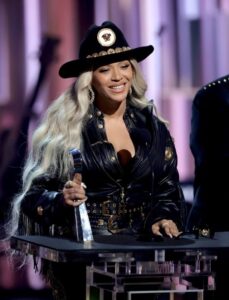Hank Williams Jr. Challenges Beyoncé’s Country Venture: A Clash of Traditions and Innovation

In the realm of country music, tradition is often held in the highest regard. Thus, when Beyoncé unveiled her genre-defying country album, “Cowboy Carter,” it was destined to spark controversy. Yet, the most scathing critique came from country music stalwart Hank Williams Jr., who publicly lambasted Beyoncé’s foray into the genre, suggesting she should face fines for what he perceives as impersonation.
“Cowboy Carter” represents Beyoncé’s audacious exploration of Americana through a contemporary lens. Blending pop, hip-hop, blues, and more, the album aims to bridge cultural divides and spotlight the overlooked contributions of Black artists to country music. However, Williams contends that Beyoncé’s approach lacks the authenticity integral to true country music. “She can never be country,” he asserted in a recent interview, denouncing her fusion of pop and hip-hop with cowboy aesthetics as a departure from the genre’s essence.
Williams’ remarks have ignited a fierce debate, underscoring a division between purists advocating for a steadfast adherence to country music’s roots and proponents of genre experimentation as a means of evolution. With his deep ties to the genre, Williams embodies a voice of tradition wary of Beyoncé’s album as a threat to country music’s integrity.

This isn’t the first instance of country music grappling with questions of authenticity and purity. The genre has evolved significantly over time, and artists like Taylor Swift and Florida Georgia Line have faced criticism for infusing pop elements into their music. Yet, Beyoncé’s album represents a new frontier, not merely mixing genres but challenging traditional narratives and historical contexts inherent to country music.
Critics of Williams argue that his stance is overly gatekeeping and fails to recognize the potential for country music to embrace inclusivity. Dr. Loretta Lynn, a music historian unrelated to the iconic singer, asserts, “Country music, like any art form, must evolve to remain relevant.” She views Beyoncé’s album as an evolutionary step, enriching the genre with new stories and voices.
Despite the controversy, “Cowboy Carter” has garnered critical acclaim for its production quality, lyrical depth, and innovative sound. The album’s commercial success has further expanded the audience for country music, particularly among younger and diverse demographics previously disengaged from the genre.
The backlash from Williams and his allies underscores a broader cultural battle over genre boundaries and participation. This debate transcends music, touching on societal issues like racial inclusion and cultural appropriation.

Supporters of Beyoncé’s album see it as a necessary disruption challenging the status quo and diversifying the genre. Cultural critic James Booker remarks, “Authenticity in music is about whose stories are told.” Beyoncé, he argues, utilizes her platform to introduce new narratives into the country genre, fostering meaningful change.
As the discourse continues, “Cowboy Carter” emerges as more than an album—it’s a cultural phenomenon challenging established notions of musical authenticity and genre limitations. Whether it will catalyze lasting change in country music remains uncertain, but for now, it provokes essential conversations about the genre’s future.
In conclusion, Hank Williams Jr.’s critique of Beyoncé’s venture into country music reflects a protective stance toward the genre’s traditions while also prompting introspection within the country music community. As genre boundaries blur, the industry faces the task of balancing tradition with innovation and embracing new voices and perspectives.
News
Video: Mike Tyson Talks Diet for Jake Paul Fight, Reveals He’s Been Eating Raw Meat
Video: Mike Tyson Talks Diet for Jake Paul Fight, Reveals He’s Been Eating Raw Meat Jeff Bottari/Zuffa LLC via Getty Images Ahead of his July 20 fight against Jake Paul, legendary heavyweight boxer Mike Tyson provided some insight into his…
(VIDEO) “Celtics Legends Unite: Jayson Tatum and Paul Pierce’s Pre-Game Chat Sets the Stage for Game 1”
“Celtics Legends Unite: Jayson Tatum and Paul Pierce’s Pre-Game Chat Sets the Stage for Game 1” In the storied history of the Boston Celtics, few players have achieved legendary status quite like Paul Pierce. A key figure in the Celtics’…
Record show of “King Midas” Taylor Swift: Helped an entire city earn 16,000 billion, 90% of hotels were sold out, airlines also made huge profits
Record show of “King Midas” Taylor Swift: Helped an entire city earn 16,000 billion, 90% of hotels were sold out, airlines also made huge profits Taylor Swift is currently the “King Midas” of the music industry, the most influential pop…
As Taylor Swift basks in the success of her latest album, at least one person is not a fan as Drake is said to take aim at Taylor Swift.
As Taylor Swift basks in the success of her latest album, at least one person is not a fan as Drake is said to take aim at Taylor Swift. Drake takes aim at Taylor Swift and others in Kendrick Lamar…
“Taylor Swift’s Eco-Conscious Move: Sells $40 Million Private Jet After College Students Track Emissions”
Billionaire Taylor Swift plays big again: Sells her $40 million private jet when college students track her emissions. Fans were wondering how she made the mad dash from her Eras Tour stop in Tokyo, Japan to get to Las Vegas…
Travis Kelce responds to Jana Kramer’s claims he’s a bad influence on girlfriend Taylor Swift because he’s ‘always drunk’… and the Super Bowl winner is NOT impressed
Travis Kelce responds to Jana Kramer’s claims he’s a bad influence on girlfriend Taylor Swift because he’s ‘always drunk’… and the Super Bowl winner is NOT impressed Travis Kelce has fired back at Jana Kramer’s claims that he’s a bad influence on his…
End of content
No more pages to load











